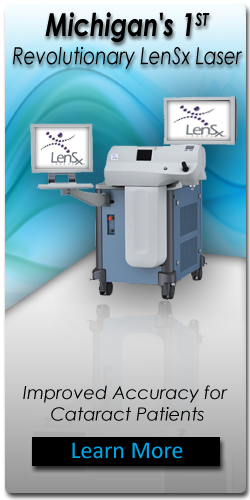Cataract Surgery
Eyesight is usually not impaired when cataracts first begin. In the early stages of cataract, simply prescribing stronger eyeglasses or increasing room lighting can successfully treat this disease. However, when cataracts cause vision loss or prevent the diagnosis of other eye diseases, cataracts should be surgically removed. The cataract removal procedure, called intraocular lens implant surgery, is very and a very common, safe, and effective surgical procedure. In fact, cataract surgery is the most widely performed non-elective surgical procedure in the world.
Traditional Cataract Surgery
Traditional cataract surgery uses a no-stitch incision and is very safe and efficient:
- Eliminates need for stitches by using the eye’s internal pressure to keep the incision tightly closed
- Eye’s shape is not distorted at all, as with older techniques
- Patient is able to return to their normal activities the day after surgery, including bending, lifting, housework, and golfing
Patient can receive a new prescription for eyewear only 14 days after surgery
Since cataract surgery is such a common procedure, there are very few complications reported. The most likely complication is a rupturing of the capsule around the lens during the procedure. This situation does not always result in a loss of vision, and it should be emphasized that rupture is very rare.
Custom Cataract Surgery with the LenSx® Laser
Until now, standard cataract procedures and custom cataract surgeries were performed without the precision of lasers. With the introduction of the first FDA approved custom cataract laser, Dr. Lavery can now create incisions and potentially reduce astigmatism up to 10 xs more precise than manual techniques for some portions of the cataract surgical procedure. In Michigan, this type of laser precision combined with Dr. Lavery's experience is available only at TLC Eyecare & Laser Centers. This laser is a revolutionary step in cataract surgery, providing better use of current lifestyle lens options in correcting astigmatism, offering computer controlled precision as it automates some of the most challenging steps of traditional refractive cataract surgery.
To learn more about cataracts and to discuss the best surgery options for your cataract treatment, please contact Dr. Lavery’s office today.

